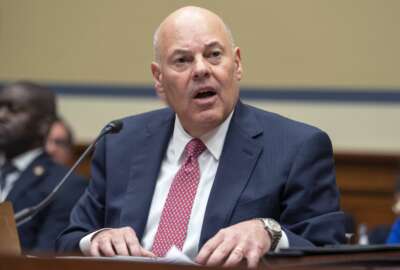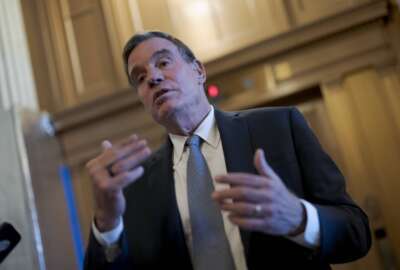Hubbard Radio Washington DC, LLC. All rights reserved. This website is not intended for users located within the European Economic Area.
26 senators tell USPS to ‘pause all changes’ to delivery network until regulator’s review
A bipartisan group of 26 senators is calling on the Postal Service to halt its network modernization changes, until an independent regulator can weigh in.
A bipartisan group of 26 senators is calling on the Postal Service to halt its network modernization changes, until an independent regulator can weigh the merits of the plan.
The senators, in a letter to Postmaster General Louis DeJoy and the USPS Board of Governors, are raising concerns about persistent mail delays in regions where the agency has opened the first of many large, regional hubs to consolidate local processing operations.
“We call on USPS to pause all changes, pending a full study of this plan by its regulator,” senators wrote. “While USPS claims these changes overall will improve service while reducing costs, there is evidence to the contrary in locations where USPS has implemented changes so far.”
Senate Homeland Security and Governmental Affairs Committee Chairman Gary Peters (D-Mich.) is leading the letter, along with Sens. Susan Collins (R-Maine) Jacky Rosen (D-Nev.) and Cynthia Lummis (R-Wyo.).
Network modernization plans remain a central part of DeJoy’s plan to cut $5 billion of costs and inefficient processes over the next two years, keep the agency from running out of cash and meet its long-term financial goals. It’s also a key part of his larger 10-year Delivering for America reform plan.
The Postal Regulatory Commission backed away from scrutinizing the 10-year plan in its entirety. But the independent regulatory agency recently asked USPS to start the process of obtaining an advisory opinion on its network modernization plans, or explain why such a review is unnecessary.
The outcome of such an advisory opinion would be nonbinding, and USPS could continue to implement its plan, regardless of the outcome. But senators are insisting that USPS go through the process before it continues with its consolidation plans.
“We are concerned about the impacts these changes have had so far, and the potential impacts that further changes could have. In regions where USPS has implemented significant changes, on-time mail delivery has declined,” lawmakers wrote. “In addition, it is not clear these changes will improve efficiency or costs.”
Federal News Network has reached out to USPS for comment. USPS spokesman David Walton said in a statement last week that USPS, at this stage, is not required to seek an advisory opinion from the Postal Regulatory Commission on the reform initiatives the agency has pursued so far, but will respond to the PRC “in more detail in this regard.”
In a recent HSGAC committee hearing, DeJoy told senators that USPS would consider requesting an advisory opinion, and said USPS would “slow down a lot of the moves” that are still in the works prior to Election Day.
“Disappointingly, the postmaster general did not commit to the scope of an advisory opinion, or to meaningfully stopping changes until further study is complete,” the senators wrote.
By contrast, DeJoy told members of the House Oversight and Accountability Committee last year that regulators scrutinizing USPS network modernization changes would slow implementation and “put this whole plan in jeopardy.”
Lawmakers’ growing opposition to USPS network changes echoes resistance the agency felt from Congress when it rolled out a similar plan more than a decade ago.
USPS began its last major consolidation effort in 2011, when it reviewed hundreds of facilities as candidates for consolidation.
USPS, however, paused those plans to close and consolidate facilities nationwide, in response to a request made by multiple senators. The agency once again put its “network rationalization” plan on hold in 2015.
USPS, on its website, states the 2015 round of network rationalization was “highly successful,” cut annual costs by nearly $1 billion, and led to “no major service disruptions.”
DeJoy, however, has repeatedly pushed back on comparing his plan to previous USPS consolidation efforts. In an exclusive interview last February, DeJoy told Federal News Network that his plan focuses on opening new, more efficient facilities to replace plants that haven’t seen meaningful upgrades in decades.
“This is by no means a consolidation of good stuff. This is a rearrangement of the furniture. I imagine we’ll come out with more square footage deployed around the nation than before we started. It’s just not going to be wasteful square footage,” DeJoy said. “I’m talking about waste, and handling things 17 times, instead of handling it once or twice — because it’s doable.”
USPS recently opened Regional Processing & Distribution Centers (RPDCs) in Atlanta, Georgia and Richmond, Virginia. These large facilities serve as hubs for long-distance transportation, where postal employees sort mail and packages going to other regions, as well as sort incoming packages for delivery in the region.
But in both cases, both regions have seen a significant drop in on-time deliveries since opening these mega-centers. DeJoy told lawmakers at the April 16 HSGAC hearing he’s still “optimistic about the changes,” and expects service to stabilize in impacted regions by this summer.
Senators, however, warn the USPS network modernization plan would have “disproportionate impacts on rural areas,” and would eliminate the possibility of overnight delivery for critical mail like medications and lab tests.
This impact on service, they warn, would stem from USPS shifting all outbound mail operations from local processing facilities to large region hubs. In some cases, a local community’s nearest mail processing site under this plan would be in another state.
Wednesday’s letter represents the strongest and most united push by Congress to rein USPS plans to shake up its nationwide delivery network. It also builds on statements lawmakers have made about USPS performance over the past few weeks.
Sen. Jon Tester (D-Mont.), who signed onto the letter, introduced a bill last week that would prohibit USPS from consolidating mail processing facilities unless the agency meets certain criteria.
The Protecting Access to Rural Carriers for Every Location (PARCEL) Act would bar USPS from moving existing processing operations across state lines, and would require USPS to conduct a “geographical review” that examines the impact of these changes.
“USPS leadership is messing with the wrong state, and I’m proud to be leading the bipartisan fight to keep postal services strong in rural America,” Tester said in a statement Wednesday.
Sens. Tina Smith (D-Minn.) and Amy Klobuchar (D-Minn.) didn’t add their names to the letter, but raised similar concerns about on-time mail delivery in their state, following the release of a recent USPS inspector general report.
USPS OIG found nearly 79,000 pieces of delayed mail at a Northern Minnesota post office in a December 2023 audit, well into the Postal Service’s year-end peak holiday season. Auditors said the delays occurred because headquarters management did not have a program in place to provide local post office managers with training on mail processing operations.
“When the mail is unreliable, it hurts Minnesotans, especially those who rely on the Postal Service to pay bills and receive paychecks and prescriptions. Yet when I ask the Postal Service for information on these disruptions, they insist everything is fine,” Smith said in a statement Tuesday.
Klobuchar said the results of the USPS OIG audit are “very concerning,” and substantiate “troubling reports about significant delays and issues with local mail delivery.”
Sen. Mark Warner (D-Va.) recently met with DeJoy to discuss service disruptions in the Richmond area. Warner told reporters last week that lawmakers and DeJoy both agree the mail delays in the Richmond area have been “totally unacceptable,” and that USPS could have done more to prepare customers and employees for the changes.
While concerned about recent mail delays, Warner said he understands USPS needs to modernize its operations to improve its long-term financial situation. Warner did not sign onto Wednesday’s letter calling for a pause in USPS network modernization.
“I do think if this reform is successfully implemented, we will see better service,” Warner said. “Back in 2020, when Mr. DeJoy was first appointed, I had real suspicions about him. I raised holy heck about him. We’ve got a whole new Postal Service board that was appointed by President Biden. And candidly, they have voted confidence in DeJoy.”
“I think he has tried to get his arms around what has been an operation that has not been updated in many ways for 20, 30, 40 years with technology,” he added. “And you’ve got, at this point, a declining revenue source of first-class mail.”
Copyright © 2024 Federal News Network. All rights reserved. This website is not intended for users located within the European Economic Area.
Jory Heckman
Jory Heckman is a reporter at Federal News Network covering U.S. Postal Service, IRS, big data and technology issues.
Follow @jheckmanWFED
Related Stories
Exclusive
Agency Oversight
Read more





